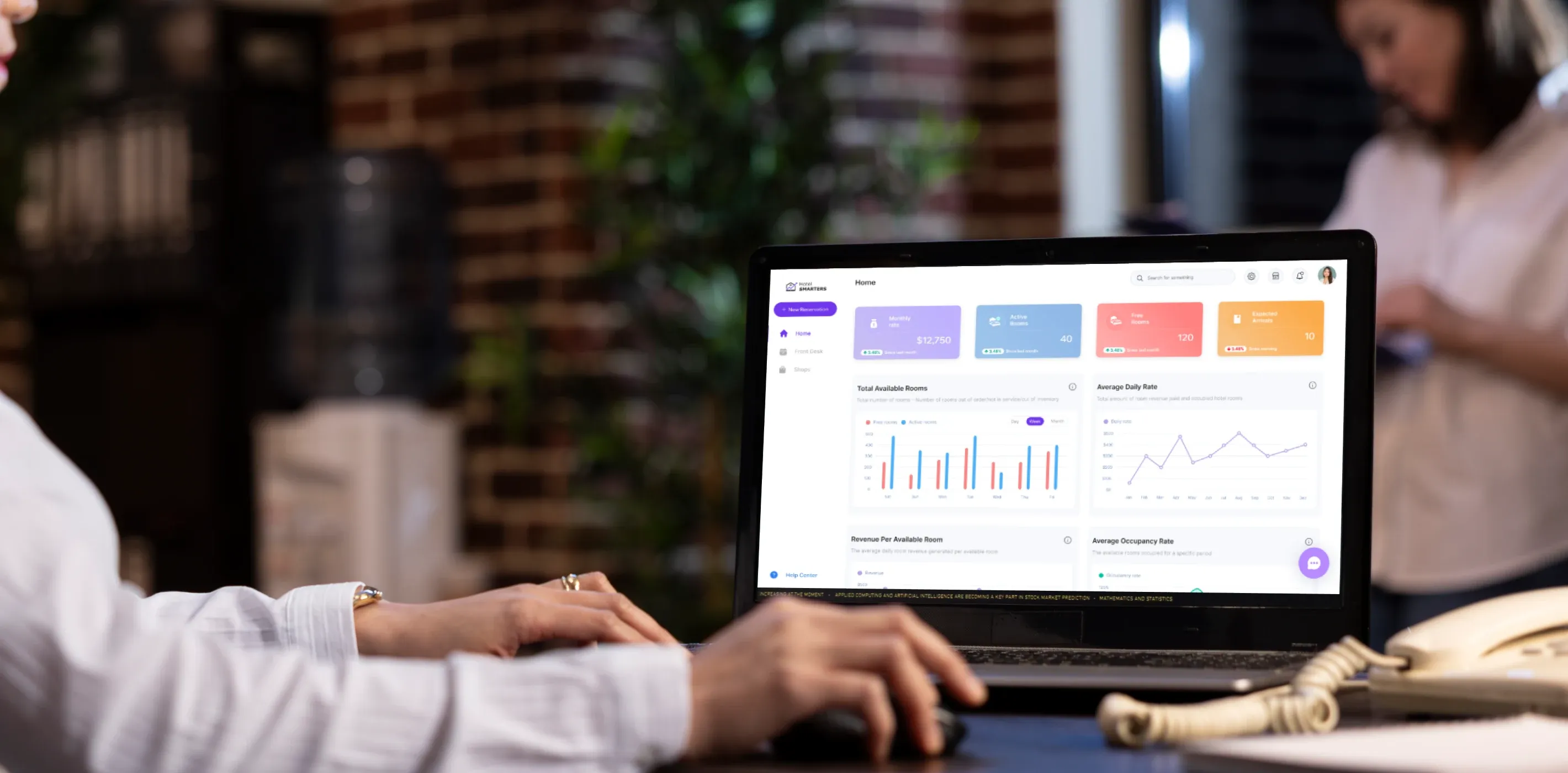

Hotel data intelligence goes beyond numbers. It enables hoteliers to understand the establishment’s strengths and weaknesses and make informed, commercially viable business decisions.
When you use data analytics effectively, you see a clear impact on your hotel's bottom line.
Skipping on data collection, storage, and analysis is a risky move. For any hotel aiming to stay competitive, embracing data is the path to staying relevant, profitable, and one step ahead.
In this article, you'll learn what hotel data analytics is all about, explore its key benefits, and discover essential data sources.

Hotel data analytics is the practice of using both digital and non-digital information to make strategic, growth-focused decisions for a hotel. It involves gathering, processing, and analyzing data to support better, more informed choices that drive a hotel’s commercial success.
The process includes multiple steps, beginning with data collection, followed by thorough analysis, and ultimately guiding data-driven decisions that improve operations and profitability.
Hotel data intelligence and analytics bring many benefits that drive efficiency and revenue growth. With no downsides to operations, data analytics empowers hotels to make smarter decisions and gain a competitive edge.
Here are some of the key advantages:
Effective hospitality data analytics helps hotel management make informed decisions that directly improve the hotel’s condition. By understanding what’s working and where improvements are needed, hotels can elevate their facilities and services. And as the hotel experience improves, customer loyalty and bookings tend to rise.
Hotels using data analytics have a straightforward path to faster growth. While other hotels might take longer to identify issues and implement improvements, data-driven hotels can quickly spot areas to refine and optimize, allowing them to grow faster.
Data-driven decisions lead to smoother hotel operations and more satisfying guest experiences. When hotels use analytics to enhance their services continually, guests notice—and they’re more likely to enjoy their stay and return in the future.
Hotel data analytics can directly impact revenue by fostering customer satisfaction and retention. Happy guests are more likely to become repeat customers and recommend the hotel to others, creating a steady increase in revenue over time.
Hotels rely on a variety of data sources for practical hotel data intelligence. Some of these data sources include:
| Data Source | Description | Used For |
|---|---|---|
| Front Desk Registrations | At check-in, customers provide key details such as name, email, date of birth, and preferences. This data is collected directly through the front desk. | - Understanding guest demographics - Personalizing guest experiences - Enhancing customer service |
| Marketing Campaigns | Hotels run both online and offline marketing campaigns to attract potential customers. Online data is easier to collect than offline. | - Identifying prospective customers - Understanding campaign effectiveness - Targeting promotions |
| Social Media | Hotels maintain active accounts on social platforms, connecting with followers, gathering feedback, and understanding customer sentiment. | - Engaging with customers - Monitoring brand reputation - Collecting customer preferences and feedback |
| Website | A user-friendly website allows customers to make online bookings, view updates, and interact with the hotel. | - Tracking booking behavior - Understanding popular amenities - Improving user experience |
| Online Travel Agencies (OTAs) | Partnering with OTAs helps hotels gain insights into traveler demographics and booking trends. These platforms also market the hotel to a wider audience. | - Accessing new customer data - Analyzing booking trends - Enhancing marketing reach |
You can leverage data analytics in various impactful ways to improve your operations and enhance the guest experience.
 Here are some effective strategies:
Here are some effective strategies:
Hotel data analytics provides a window into guest experiences and preferences, allowing management to tailor offerings to better meet customer needs. By analyzing customer feedback and behavior, you can make informed improvements that boost guest satisfaction and foster loyalty.
Hotel data insights offer a clear view of an establishment’s revenue management, pinpointing areas that need improvement and those that drive profit. By identifying patterns and trends, you can optimize pricing, promote popular services, and make data-backed decisions that strengthen revenue.
With hospitality analytics tracking daily operational costs, hotels can identify where to cut back without compromising quality. Reducing unnecessary expenses increases profitability, enabling you to reinvest in areas that improve the guest experience and support growth.
Hotel guest data analytics helps you create highly targeted marketing campaigns to reach the right audience with the right message. By understanding customer segments and behaviors, you can focus on campaigns that attract loyal guests and encourage repeat visits.
Based on usage patterns and historical data, analytics derived from hotel housekeeping software and other sources can also forecast when maintenance is likely needed. This proactive approach reduces costly breakdowns, keeps facilities in shape, and ensures a seamless guest experience.
Effective hotel data analytics depends on a few essential metrics, all focused on driving the hotel’s overall growth and profitability. Here are the key metrics every hotel should monitor:
These metrics offer insights into guest satisfaction and loyalty, guiding improvements in customer service. Key customer metrics include the customer satisfaction rate, retention rate, and acquisition cost. These indicators reveal how satisfied guests are, how often they return, and the cost of acquiring new customers through marketing.
Focused on optimizing income, these metrics help hotels maximize profits while minimizing unnecessary costs. Important revenue metrics include occupancy rate, revenue per available room (RevPAR), and the gross profit-to-net profit ratio, which together help hotels understand where they’re profiting most and where improvements are needed.
These metrics track daily expenses to help hotels manage costs more effectively. By monitoring hotel accounting metrics like revenue minus labor and operational expenses, hotels can identify opportunities to reduce costs and improve overall profitability, without sacrificing quality.
Digital metrics capture how well the hotel connects with potential and existing customers online. Key metrics include website conversion rate, social media engagement, online reviews, and email open rates. These insights help hotels gauge the effectiveness of their digital presence, from initial customer interest to engagement and loyalty.
Implementing effective hotel data analytics comes with its own challenges, which can impact analytics processes and daily operations.
Here are a few of the most common hurdles and their possible solutions:
Many hotels lack in-depth data analytics knowledge, leading to low adoption rates and missed opportunities to improve hotel operations. The hotel staff may not fully embrace data-driven approaches without a clear understanding of its benefits and best practices.
Solution: Invest in data analytics training for your staff and use user-friendly analytics tools that simplify data interpretation. Partner with hospitality tech experts to make informed decisions with no technical expertise requirements.
Reliable data is the backbone of effective analytics. When you work with incomplete, inaccurate, or outdated data, the insights generated are flawed, making it difficult to make meaningful improvements. High-quality, organized data is essential to truly benefit from analytics.
Solution: Implement data validation processes and use automated data management systems to ensure accuracy and completeness. Regular data audits and real-time updates can help maintain high-quality, reliable data for better decision-making.
Many establishments still lack the technology to support big data analytics in the hotel industry. In this case, valuable data cannot be fully leveraged without the right software and tools. This naturally limits your ability to use analytics to drive growth. That’s why access to the right technology is crucial to collecting hotel data intelligence.
Solution: Use modern data analytics platforms and cloud-based management systems to efficiently collect and analyze data.
 Overcoming the common challenges in hotel data analytics—like limited knowledge, poor data quality, and a lack of advanced technology—requires the right tools and guidance.
Overcoming the common challenges in hotel data analytics—like limited knowledge, poor data quality, and a lack of advanced technology—requires the right tools and guidance.
HotelSmarters offers a suite of tech solutions designed to help hotels make the most of their data analytics potential, driving growth and enhancing guest satisfaction. Here’s how our solutions address these challenges:
Our dashboards and reporting tools are designed with ease of use in mind, empowering hotel staff at any skill level to extract insights and make data-driven decisions confidently.
Our technology ensures accurate and organized data collection, which is essential for meaningful analytics. Using reliable data-gathering processes and automated management tools, we help hotels reduce the risk of flawed or incomplete data, allowing for a more precise and actionable picture of guest behaviors and preferences.
Our team helps your hotel staff understand the full capabilities of our hotel technology tools, ensuring they’re confident in using data insights to improve operations, reduce costs, and enhance guest experiences.
With HotelSmarters, your hotel can turn data analytics challenges into growth opportunities.
Hotel data analytics offers hotels a powerful tool to make impactful, data-driven decisions that drive growth and improve operations.
Just as in other industries, data analytics in hospitality is essential for success, helping hotel management refine policies, streamline focus, and implement strategies that foster both growth and guest satisfaction.
To truly harness the benefits of data analytics, hotels need advanced technology solutions that simplify data collection, analysis, and actionable insights.
Hotels collect a range of personal data from guests, including names, room and amenity preferences, dates of birth, phone numbers, social media handles, and email addresses.
In some cases, hotels may also collect financial and occupational information to tailor the guest experience.
Hotel data analytics plays a key role in maximizing revenue by identifying ways to cut operational and labor costs. It also highlights underperforming revenue areas, giving hotel management clear targets for improvement to increase profitability.
Yes, smart TV data is a valuable resource for hotel analytics. It provides insights into guest preferences, helping hotels enhance services, leading to a more personalized experience.
Hotels encounter several challenges with data analytics, including a lack of knowledge about implementing it effectively and limited access to advanced technology. These barriers can hinder a hotel’s ability to fully leverage data for growth.
Hotels leverage hotel customer data analytics to refine their marketing strategies, tailoring campaigns to match guest demographics, interests, and booking behaviors. By focusing on data-driven insights, hotels can improve conversion rates, increase customer retention, and optimize marketing budgets for maximum impact.
Founder / CEO
Andranik is the CEO and Co-Founder of inoRain OTT and the Co-Founder of HotelSmarters, specializing in next-generation streaming technologies and digital transformation for the hospitality sector. He focuses on building innovative, scalable solutions for video delivery, OTT monetization, and data-driven hospitality management. His work bridges technical sophistication with practical business impact, helping organizations modernize their digital ecosystems and improve operational efficiency.